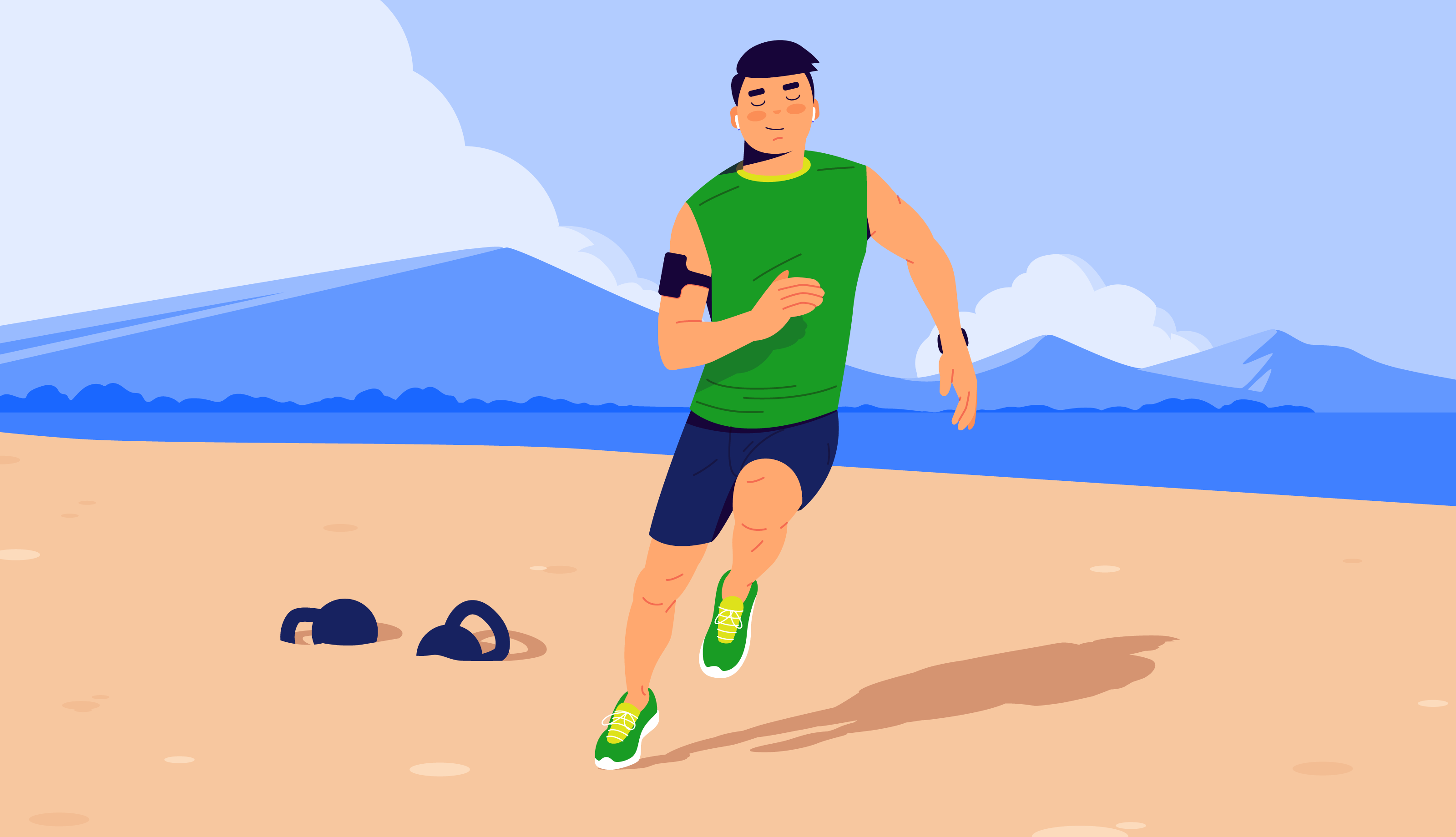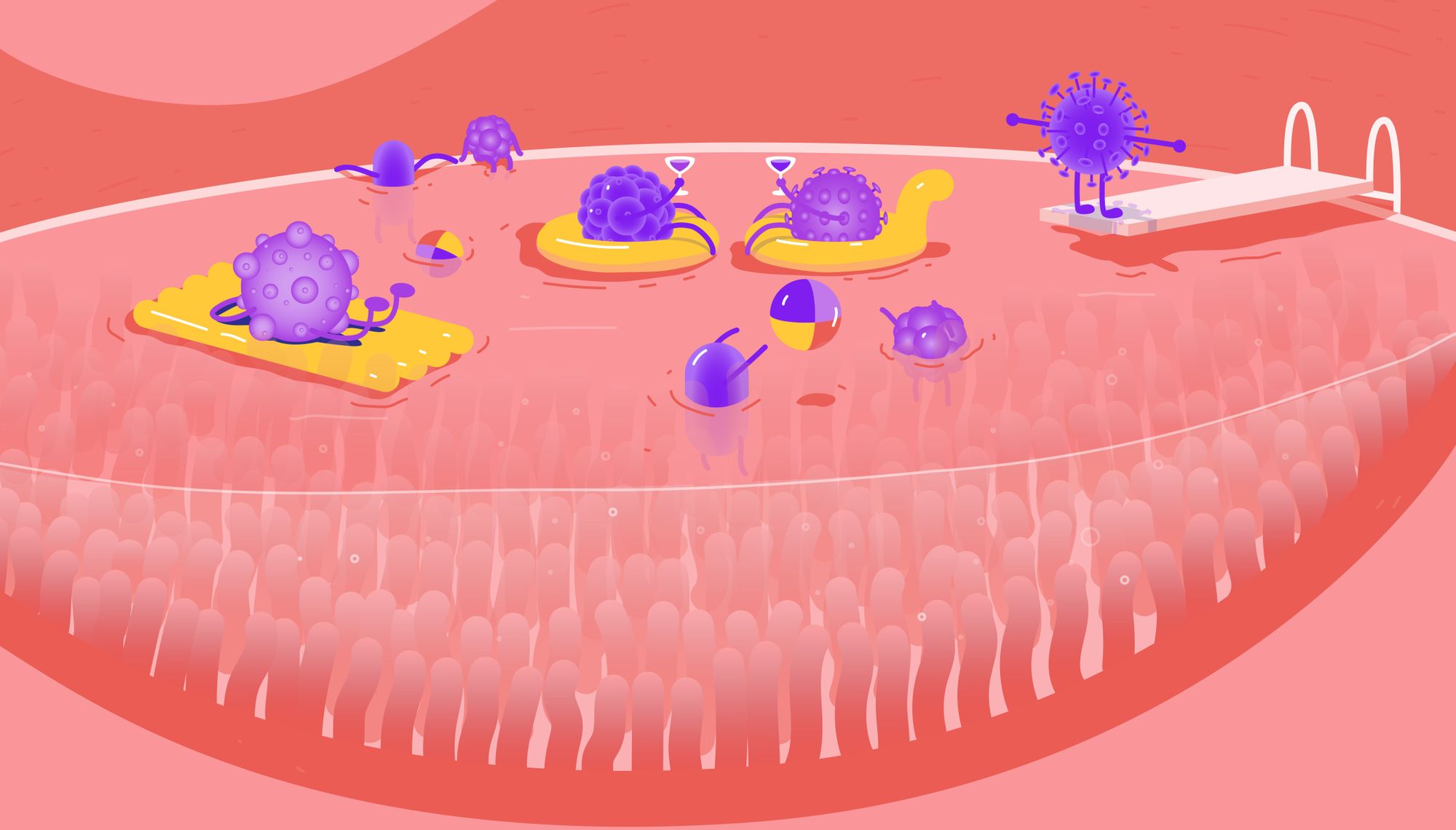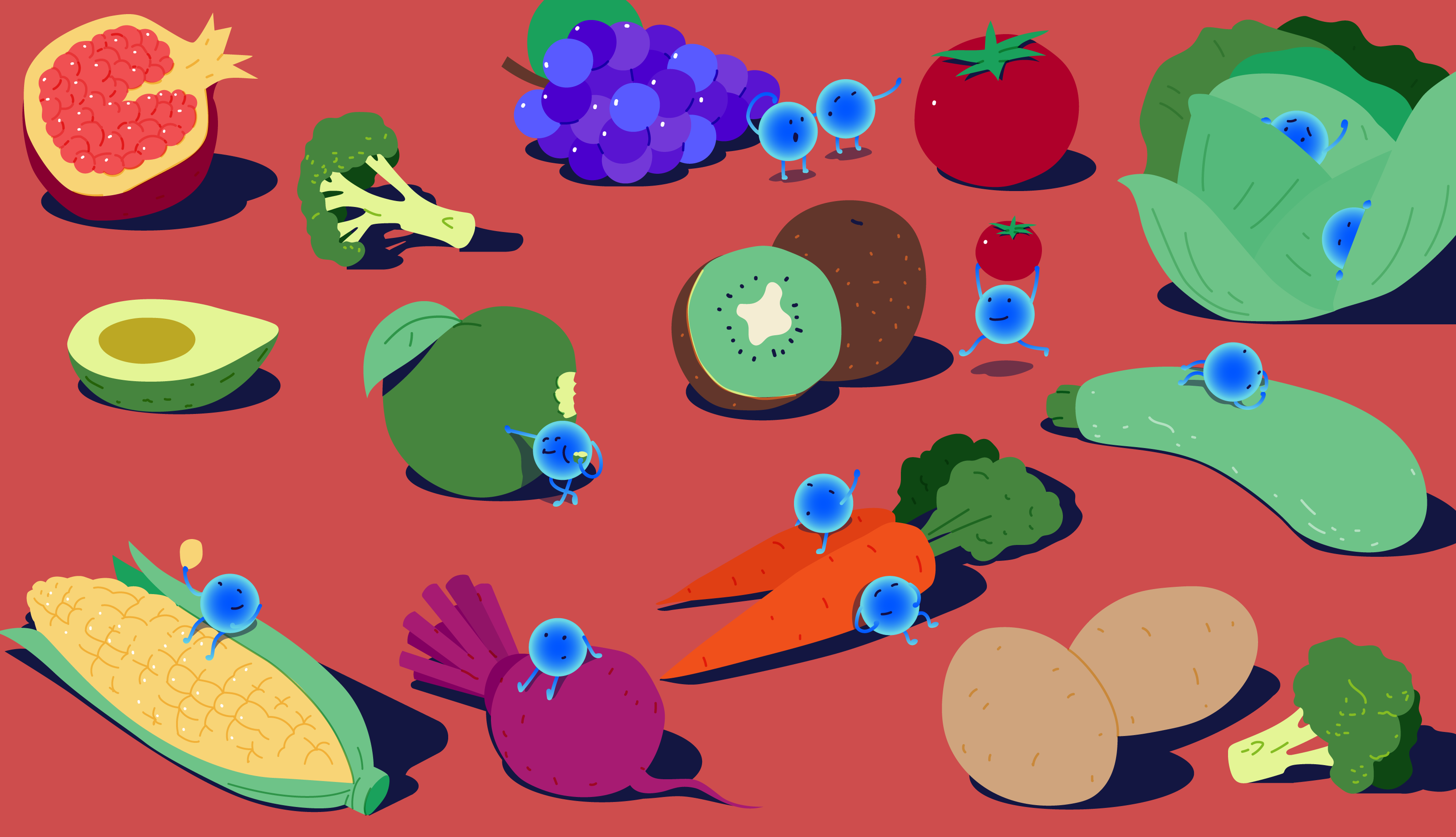Your gut microbes are involved in many aspects of your sports activity, from fuelling your body to aiding post-workout recovery.
New technologies have made it possible to explore the role of gut bacteria in health and disease. Researchers have also turned their focus to how the microbiota interacts, influences, and is affected by your activity levels, whether you’re a snowboarding pro or a Sunday Parkrun jogger.
Like the gut-brain axis, interaction between physical exercise and the gut microbiome is bi-directional. Increased activity improves blood flow and bowel motility, which benefits these microorganisms, and, in return, they enhance nutrient production and metabolic activities.
With the help of our Director of Microbiome Research, Dimitry Alexeev, we'll review the current science on sports and the gut microbiome, and explain how to make exercise mutually beneficial to you and your gut bacteria.
Table of contents
- Nutrients and metabolism
- Bacteria that like sports
- Moderate-intensity exercise
- Probiotics for intense training
- How to manage your gut health
Nutrients and metabolism
Gut bacteria produce essential nutrients for the body, like vitamins and short-chain fatty acids, and exercise can ramp up other important metabolic activities.
Exercise puts the body under stress, and that’s not a bad thing. Muscles release proinflammatory molecules that increase their sensitivity to glucose that they use to produce energy. Once the energy stores of the muscles are depleted, it activates pathways that allow the body to use the energy from its fat stores.
Sports is more than just physical aptitude, your microbiome counts too
Workouts also stimulate the heart and respiratory system to increase oxygenation of the blood, because muscles also need oxygen for fuel. They even encourage the creation of new blood vessels to better irrigate your body’s tissues.
In order to function, the body needs a range of substances that it can’t necessarily produce itself. This is part of the reason why microbiome research has garnered attention: it produces vital nutrients from prebiotic carbohydrates in our diet.
Research shows that the gut microbiota of athletes produces more short-chain fatty acid production, as was amino acid biosynthesis - amino acids are the building blocks of protein. Their gut microbes were also better at metabolising carbohydrates, the fuel for their beneficial activities.
☝️TIP☝️ To fulfil its potential for your body, your gut microbiome needs a regular and diverse supple of prebiotics (dietary fibers and resistant starches) found in whole, plant foods like legumes, whole grains, fruit, vegetables, seeds, and nuts.
Bacteria that like sports
Exercise induces changes in the composition of the gut microbiome that can help manage inflammation and lactic acid build-up.
In particular, exercise leads to higher levels of Akkermansia muciniphila, a beneficial microbe that feeds on the protective mucous layer of the gut lining. This is good because it stimulates the production of more mucous, which strengthens to gut barrier and helps control inflammation.
Here's everything we said in a nutshell by Gut Microbiota For Health
According to a Harvard study, after running a marathon, elite endurance athletes had a bacterium: Veillonella atypica. Studies in mice discovered that V. atypica performs a valuable function for athletic performance: they are able to turn lactate into an important short-chain fatty acid called propionate.
Interestingly, other types of Veillonella were found to increase in patients with disease. However, researchers don’t yet know if these microbes are protecting from or promoting the disease. For example, lactate bacteria are present in autism.
Seasoned sports buffs will already be familiar with lactate, it’s the substance that accumulates in the muscles after intense workouts and causes that trademark muscle pain after exercise. And V. atypica is able to turn it into propionate that the liver uses to make glycogen, which replenishes muscle energy stores.
☝️TIP☝️Exercise induces beneficial changes in the gut microbiome, and it also stimulates bowel motility. That’s why doctors recommend exercise to people with constipation .
Moderate-intensity exercise
Research shows that the intensity of exercise sessions is not only tightly connected with health, but also with the gut microbiome.
Examples of moderate-intensity exercise
| Brisk walking | Tennis (doubles) |
| Badminton | Swimming (recreational) |
| Exercise classes | Yoga (active forms) |
By U.S. Centers for Disease Control “Physical Guidelines for Americans”
Research shows that moderate activity and cardio have a positive effect on the gut microbiome. In addition to the ones we mentioned in Nutrients and metabolism, it also increases diversity, an essential parameter for gut microbiome health.
Moderate exercise also influences the gut by improving circulation, bowel motility, and immune function. Research also shows that people who exercise regularly tend to adapt better eating habits, preferring whole plant foods and lean meats to fried and processed foods, which is also good for gut microbes.
Probiotics for intense training
When an exercise regimen is ramped up to high intensity and frequency, it can cause disturbances that may be mediated by probiotics.
When exercise intensity approaches competition levels, the body undergoes multiple changes. Blood flow is directed to the muscles, rather than the gut, and sweating for long periods can deplete your body’s sodium levels. It also puts a strain on the immune system.
Exertional heatstroke is also a significant risk factor in high-level sports, caused by the body overheating to a dangerous point. If not caught on time, it can be deadly.
Yoga's a lot more harder and more physically taxing than people think
Exertional heatstroke can also lead to endotoxemia, because it weakens the intestinal barrier and allow bacterial toxins into the bloodstream. In extreme cases, it can cause a deadly immune reaction, called endotoxic shock.
How to manage gut health
Here are three ways to enhance recovery and microbiome performance, while protecting your health from the stress of exercise.
As you now know, exercise changes how your body works. The requirements of your metabolism increase, demanding more energy and more nutrients to keep the body functioning at optimal power. It also stimulates your immune system and induces positive changes in the gut microbiota.
Even though it’s in the early days, there’s enough evidence to highlight several ways to support your performance and your microbiota when you exercise regularly:
- Get enough prebiotic dietary fibers - this is an essential difference between professionals and beginners. Dietary fibers are a great energy source that fuel a healthy microbiome, helping to remove lactic acid build-up, recover glycogen, and protect from disease and trauma.
- Taking probiotics can potentially aid immune system function during high-intensity training and support a healthy gut microbiome, thus lowering health risks associated inflammation.
- A balanced gut microbiome and a responsible approach to nutrition can support performance and maintain a healthy gut when you make exercise part of your routine.
☝️TIP☝️Subscribe to the blog and get 10% off your Atlas Microbiome Test purchase.
- den Besten, Gijs, et al. "The role of short-chain fatty acids in the interplay between diet, gut microbiota, and host energy metabolism." Journal of lipid research 54.9 (2013): 2325-2340.
- Vighi, G., et al. "Allergy and the gastrointestinal system." Clinical & Experimental Immunology 153 (2008): 3-6.
- Dominguez-Bello, Maria Gloria, et al. "Role of the microbiome in human development." Gut 68.6 (2019): 1108-1114.
- Khanna, Sahil, and Pritish K. Tosh. "A clinician's primer on the role of the microbiome in human health and disease." Mayo Clinic Proceedings. Vol. 89. No. 1. Elsevier, 2014.
- Belzer, Clara, and Willem M. De Vos. "Microbes inside—from diversity to function: the case of Akkermansia." The ISME journal 6.8 (2012): 1449.
- West, Christina E., et al. "The gut microbiota and inflammatory noncommunicable diseases: associations and potentials for gut microbiota therapies." Journal of Allergy and Clinical Immunology 135.1 (2015): 3-13.
- Langdon, Amy, Nathan Crook, and Gautam Dantas. "The effects of antibiotics on the microbiome throughout development and alternative approaches for therapeutic modulation." Genome medicine 8.1 (2016): 39.
- Zinöcker, Marit, and Inge Lindseth. "The Western diet–microbiome-host interaction and its role in metabolic disease." Nutrients 10.3 (2018): 365.
- Munukka, Eveliina, et al. "Six-week endurance exercise alters gut metagenome that is not reflected in systemic metabolism in over-weight women." Frontiers in microbiology 9 (2018): 2323.
- Barton, Wiley, et al. "The microbiome of professional athletes differs from that of more sedentary subjects in composition and particularly at the functional metabolic level." Gut 67.4 (2018): 625-633.
- Scheiman, Jonathan, et al. "Meta-omics analysis of elite athletes identifies a performance-enhancing microbe that functions via lactate metabolism." Nature Medicine (2019): 1.
- Codella, Roberto, Livio Luzi, and Ileana Terruzzi. "Exercise has the guts: how physical activity may positively modulate gut microbiota in chronic and immune-based diseases." Digestive and Liver Disease 50.4 (2018): 331-341.
- Zhao, Xia, et al. "Response of gut microbiota to metabolite changes induced by endurance exercise." Frontiers in microbiology 9 (2018): 765.
- [Nieman, David C., and Laurel M. Wentz. "The compelling link between physical activity and the body's defense system." Journal of sport and health science 8.3 (2019): 201-217.](https://doi.org/
- Petersen, Lauren M., et al. "Community characteristics of the gut microbiomes of competitive cyclists." Microbiome 5.1 (2017): 98.
- Mach, Núria, and Dolors Fuster-Botella. "Endurance exercise and gut microbiota: A review." Journal of Sport and Health Science 6.2 (2017): 179-197.
- Diduch, Barry Kent. "Gastrointestinal conditions in the female athlete." Clinics in sports medicine 36.4 (2017): 655-669.
- Möller, Gabriella Berwig, et al. "Supplementation of Probiotics and Its Effects on Physically Active Individuals and Athletes: Systematic Review." International journal of sport nutrition and exercise metabolism 00 (2019): 1-12.
- Colbey, Candice, et al. "Upper respiratory symptoms, gut health and mucosal immunity in athletes." Sports Medicine 48.1 (2018): 65-77.
- Walter, Edward, and Kiki Steel. "Management of exertional heat stroke: a practical update for primary care physicians." Br J Gen Pract 68.668 (2018): 153-154.
- Lambert, G. Patrick. "Intestinal barrier dysfunction, endotoxemia, and gastrointestinal symptoms: the ‘canary in the coal mine’during exercise-heat stress?" Thermoregulation and Human Performance. Vol. 53. Karger Publishers, 2008. 61-73.























